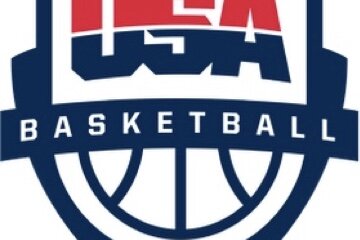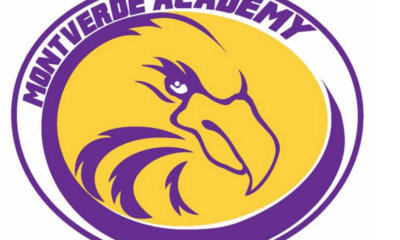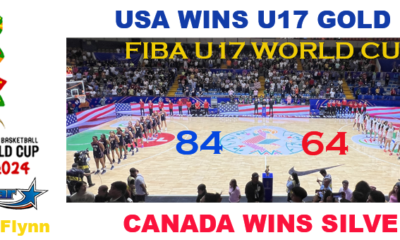
PRAGUE, Czech Republic — The United States’ U19 men’s basketball team made a mockery out of the once intense sports rivalry that existed between this country and Russia during the cold war era. The U.S. blew away Russia, 115-47, in the third and final preliminary Group D game of the FIBA age group World Championships at the O2 Arena here. This team is just obliterating its competition, beating both Ivory Coast and China by 56 points in its first two games.
But the gap between the U.S. and Russia in this age group was eye opening, and mind boggling, given the fact Russian had two games to at least scout Team USA. Just two years ago, in fact, the Russians defeated the U.S., 79-74, in the quarterfinals of U19 Worlds, drilling the Americans for 17 three pointers.
This particular U.S. entry is raising eyebrows with the way 6-10 high school pennon Jonathan Okafor and 6-9 forward Montrez Harrell from Louisville physically overpowered the Russia’s 7-2 Andey Desyantnikov and 6-9 Igo Kanygin inside.
Outside they’re utilizing havoc pressure to take the Russian guards, including 6-2 shooter Mikhail Kulagin, completely out of the game to a point where they couldn’t get the ball up the floor in the required 24 seconds to run an effective half-court offense.
“We’ve been playing great ball for a team we just assembled a couple weeks ago,” point guard Marcus Smart said. “We’ve been beating teams by 50 points. For us, there’s definitely a rivalry between us and every other team that’s here. In 26 years, we’ve only won 26 gold medals in this particular age group. It’s us against the world.”
The Americans put seven players in double figures and got contributions from every player on this well coached 12 man roster. True, it’s still early and the competition gets tougher this week with second round games against Brazil, Australia and a huge game Wednesday against unbeaten Serbia.
But team USA knows who it is — and who it isn’t .
Where the better teams in the rest of the world rely heavily on the kick out to three to kick start their offense, the Americans are more concerned with forcing backcourt turnovers and creating easy baskets. Harrell, who played the point of the press, converted three steals into thunderous dunks. This is a fun team to watch and the chemistry is good, primarily because USA basketball has built its model around players who want to represent their country and do not feel like they are being forced to participate.
The first and second units are equally as balanced, with Donovan getting as much from a starting lineup of Harrell, forward Janrell Stokes and guards Efried Payton, Rasheed Sulammon and Smart as he does from a second unit of center Jahlil Okafor, forwards Aaron Gordon and Justice Winslow and guards Nigel Williams-Goss and Michael Frazier.
“I think probably for myself the coaching staff, there’s a sense of how competitive the games between the United States and the Soviet Union have been in all sports,” USA coach Billy Donovan said. “I think for these guys, they don’t realize what happened in 1972
“Tonight, our press and defense kind of overwhelmed them. I think our guys have got a view of the bigger picture in terms of winning the gold medal and right now, Russia is probably not one of the better teams here. I’m just telling it like it is.”
The history of US-Soviet men’s basketball were triggered by an incident that occurred in the 1972 Olympics in a late night gold medal game at a sports Hall in Munich. The U.S. had never lost an Olympic game, winning 63 straight games in international competition. But the veteran Soviet team finally got the best of a young college team, 51-50, on a disputed play that came after Doug Collins made a pair of free throws to lift the Americans to a 50-49 lead with 0:03. remaining. The Soviets attempted a long pass on the final play that went out of bounds and the Americans thought they had won.
But as the clock was in the process of being reset when play resumed, the floor had to be cleared again and the three seconds were reinstated, giving the Soviets another chance. The Americans put no pressure on the inbounds pass and Ivan Edeshko threw a Hail Mary pass to Alexander Belov, who bused off Jim Forbes and Kevin Joyce and made a game winning layup as the final buzzer sounded.
This time the result stood. The Americans appealed but the five man jury was made up of representatives from three Communist countries– Cuba, Poland and the USSR, who rejected the appeal, 3-2. The U.S. refused to accept the silver medals, which still sit in a locked vault in Lausaunne, Switzerland. Just three members of the U.S. team had international experience before the game and the team had played just 12 exhibitions together. The veteran Soviets had played close to 400.
The cold war between the countries continued through the 80’s. The U.S. boycotted the 1980 games in Moscow because of Afghanistan and the Soviets refused to come to LA. in 1984. In 1988, the Soviets upset the United States in the Olympic semi-finals.
Much has changed since the breakup of the Soviet Union in 1996 although the Russian senior men’s team, to its credit, did capture a bronze medal in the 2012 Olympics, upsetting Argentina in the third place game and the U19 team won bronze in 2011.
But, they were no match for the Americans in this particular game. The Americans’ biggest rival at all levels now appears to be Spain.
“Whether it’s Russia or whichever team we face, we’re going in three and looking at every game as a rivalry game,” Sulaimon said. “I feel it’s us against the world every time we play. There’s a lot of countries against us. ‘I’m a little surprised at the margin of victory. But we have such a talented group of guys, we have a chance to do this each and every game we play. With the length and talent, athleticism and depth we have we can force a lot of havoc. We just try to get teams out of their rhythm. These teams are great when they get into their offense. They’ve very fundamental. We just try to get disrupt them and get them out of their flow before the shot clock goes off.”
Mike Flynn is owner and operator of Blue Star Basketball and U.S. Junior Nationals. He is a National Evaluator and publishes the Blue Star Report which ranks the top 100 high school girls basketball players in the nation. He also serves as Secretary of the Middle Atlantic District AAU, National Chair for AAU Lacrosse, Consultant to Gatorade for girls basketball, member of the McDonald's All–American selection committee, & Consultant for Nike Global Basketball.

Latest Articles
-


Christopher Lawlor
/ 3 days agoU16 USA Women’s Basketball National Team roster selected for 2025 FIBA AmeriCup in Mexico from June 16-22
COLORADO SPRINGS, Colo. — USA Basketball announced today the 2025 USA Women’s U16 National...
-
Christopher Lawlor
/ 3 days agoU16 USA Men’s Basketball National Team roster chosen for 2025 FIBA AmeriCup next week in Juarez, Mexico
COLORADO SPRINGS, Colo. – The team is set and now for the games South...
-
Christopher Lawlor
/ 7 days agoNO REGRETS: Chris McNesby steps away from Roman Catholic (PA) basketball gig after second tenure with his alma mater; Bradley Wanamaker takes over coveted post
BENSALEM, Pa. – Chris McNesby has lived many lives within the Philadelphia Catholic League....
-


Events
/ 1 week agoMORE CHANGE: Montverde Academy (FL) hires Anthony Jones from nearby Orlando as girls’ head basketball coach of national program
BENSALEM, Pa. – For the second time in three months, Montverde (Fla.) Academy made...








